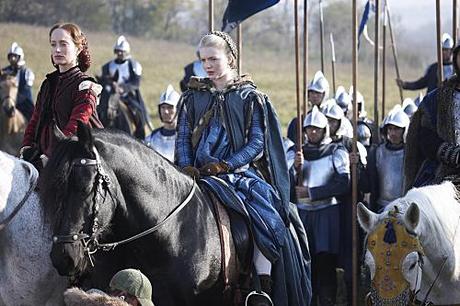This season finale felt like a summary of all the issues that have plagued the series since its inception. At the heart of the problem is the show’s inconsistent tone: sometimes remarkably dark, sometimes overly sympathetic, and sometimes oddly comedic. It’s hardly impossible to blend all those elements together in a superior package. It’s been done many times before. But that’s why it sticks out as so glaring with “The Borgias”.

Others have said that the show suffers from unfortunate timing. Granted, it has serious competition in its general subgenre. Right now, “Game of Thrones” is staking a strong claim as the frontrunner, with “Camelot” and “The Borgias” battling it out for a distant second. One would think, given its historical basis, that “The Borgias” would have a bit of an advantage. Sadly, Neil Jordan just doesn’t seem to be putting the pieces together as well as he could.
It comes down to the characters. Providing a semi-accurate depiction of history worked for “Rome” and “The Tudors”, but they also had compelling main characters that made those historical events relevant to the audience. At this point, I don’t think the Borgias as a whole have been explored in the kind of depth that is necessary for us to care about the external threats to their control over Rome.
As I’ve said before, Rodrigo and Lucrezia are the two most well-rendered characters, but they both suffer from inconsistent treatment. Rodrigo is supposed to be the cunning “godfather” of the clan, but too often, his plot threads are played for semi-dark comedy. This finale brings that home in the unusual resolution to Lucrezia’s disturbing first marriage. I have no idea if this is how the issue was settled historically, but I was expecting a bit more direct resolution from Lucrezia, to bolster the notion of her evolution into the “femme fatale” of legend.
But let’s face it: the real problem here is the treatment of Cesare, which changes dramatically depending on the requirements of the scene and situation. Sometimes he demonstrates the ruthlessness he is known for, but in other cases, he’s a bit of a whining annoyance. They do play up his role as the son with curtailed ambitions, held back by the demands of the family, but that’s never quite consistent enough to be a driving motivation. It’s just trotted out when it’s needed.
Another example would be the lackluster means by which Rodrigo defused the situation with the French king. Sure, that’s more or less how it played out, but it could have been played differently, either to make it more tense or to highlight Rodrigo’s cunning more effectively. I suppose we are to suspect that Rodrigo knew about the plague in Naples all along, but even that revelation just didn’t have the desired impact. We were never given a reason to care.
That will be the challenge for the second season. Perhaps it’s just as simple as allowing someone other than Neil Jordan to write the episodes, but two key improvements are at the top of the list: the characters must be more consistent, and the overall tone of the series must be better established. Otherwise, this will end up being little more than a missed opportunity.
Writing: 1/2
Acting: 2/2
Direction: 2/2
Style: 1/4
Final Rating: 6/10
(Season 1 Final Average: 6.6)

